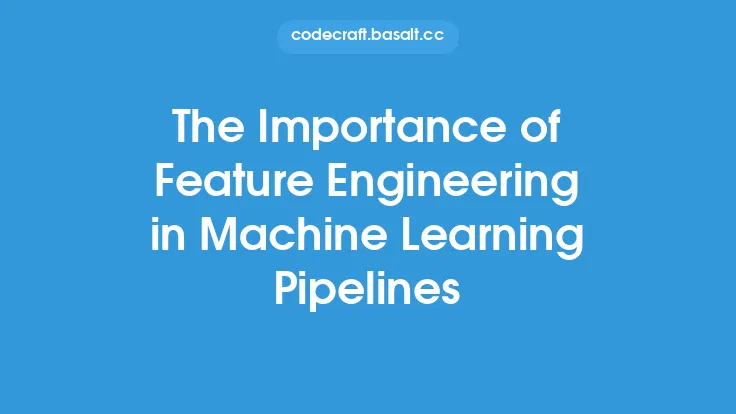When it comes to feature engineering, one of the most critical aspects that can make or break the success of a machine learning model is domain knowledge. Domain knowledge refers to the expertise and understanding of the specific problem domain, industry, or field that the machine learning model is being applied to. In feature engineering, domain knowledge plays a vital role in identifying relevant features, selecting appropriate feature extraction methods, and transforming raw data into meaningful features that can be used to train accurate machine learning models.
Introduction to Domain Knowledge
Domain knowledge is the foundation upon which feature engineering is built. It provides the context and understanding necessary to identify the most relevant features and to transform raw data into meaningful insights. Domain experts, such as engineers, scientists, or business analysts, possess a deep understanding of the problem domain and can provide valuable insights into the data and the relationships between different variables. This expertise is essential in feature engineering, as it allows data scientists to identify the most relevant features, select the most appropriate feature extraction methods, and transform raw data into meaningful features that can be used to train accurate machine learning models.
The Role of Experts in Feature Engineering
Experts play a crucial role in feature engineering, as they bring a deep understanding of the problem domain and the data to the table. They can provide valuable insights into the relationships between different variables, identify relevant features, and select the most appropriate feature extraction methods. Experts can also help to identify potential biases in the data, ensure that the features are relevant and meaningful, and provide context to the data that may not be immediately apparent to data scientists. Furthermore, experts can help to validate the features and ensure that they are accurate and reliable, which is critical in machine learning modeling.
Technical Aspects of Domain Knowledge in Feature Engineering
From a technical perspective, domain knowledge is essential in feature engineering, as it provides the context and understanding necessary to identify the most relevant features and to transform raw data into meaningful insights. For example, in natural language processing, domain knowledge is critical in identifying relevant features, such as sentiment analysis, entity recognition, and topic modeling. In computer vision, domain knowledge is essential in identifying relevant features, such as object detection, image segmentation, and facial recognition. In addition, domain knowledge is critical in selecting the most appropriate feature extraction methods, such as wavelet transforms, Fourier transforms, or convolutional neural networks.
Domain Knowledge in Feature Selection
Domain knowledge is also essential in feature selection, which is the process of selecting the most relevant features from a large set of potential features. Feature selection is critical in machine learning, as it can significantly impact the performance of the model. Domain experts can help to identify the most relevant features, select the most appropriate feature selection methods, and ensure that the features are relevant and meaningful. For example, in a medical diagnosis problem, domain experts can help to identify the most relevant features, such as symptoms, medical history, and test results, and select the most appropriate feature selection methods, such as recursive feature elimination or correlation-based feature selection.
Real-World Applications of Domain Knowledge in Feature Engineering
Domain knowledge has numerous real-world applications in feature engineering, including healthcare, finance, marketing, and computer vision. For example, in healthcare, domain knowledge is critical in identifying relevant features, such as medical history, symptoms, and test results, and selecting the most appropriate feature extraction methods, such as wavelet transforms or convolutional neural networks. In finance, domain knowledge is essential in identifying relevant features, such as stock prices, trading volumes, and economic indicators, and selecting the most appropriate feature extraction methods, such as autoregressive integrated moving average (ARIMA) models or long short-term memory (LSTM) networks.
Challenges and Limitations of Domain Knowledge in Feature Engineering
While domain knowledge is essential in feature engineering, there are several challenges and limitations that need to be addressed. One of the main challenges is the availability of domain experts, who may not always be available or may not have the necessary expertise. Another challenge is the integration of domain knowledge with machine learning algorithms, which can be complex and require significant expertise. Additionally, domain knowledge can be subjective and may not always be accurate or reliable, which can impact the performance of the model.
Best Practices for Incorporating Domain Knowledge in Feature Engineering
To incorporate domain knowledge in feature engineering, several best practices can be followed. First, it is essential to collaborate with domain experts, who can provide valuable insights into the problem domain and the data. Second, it is critical to use domain knowledge to identify relevant features and select the most appropriate feature extraction methods. Third, it is essential to validate the features and ensure that they are accurate and reliable. Finally, it is critical to continuously update and refine the features, as the problem domain and the data may change over time.
Conclusion
In conclusion, domain knowledge is a critical aspect of feature engineering, as it provides the context and understanding necessary to identify relevant features, select appropriate feature extraction methods, and transform raw data into meaningful insights. Domain experts play a vital role in feature engineering, as they bring a deep understanding of the problem domain and the data to the table. By incorporating domain knowledge into feature engineering, data scientists can build more accurate and reliable machine learning models that can drive business value and improve decision-making.





